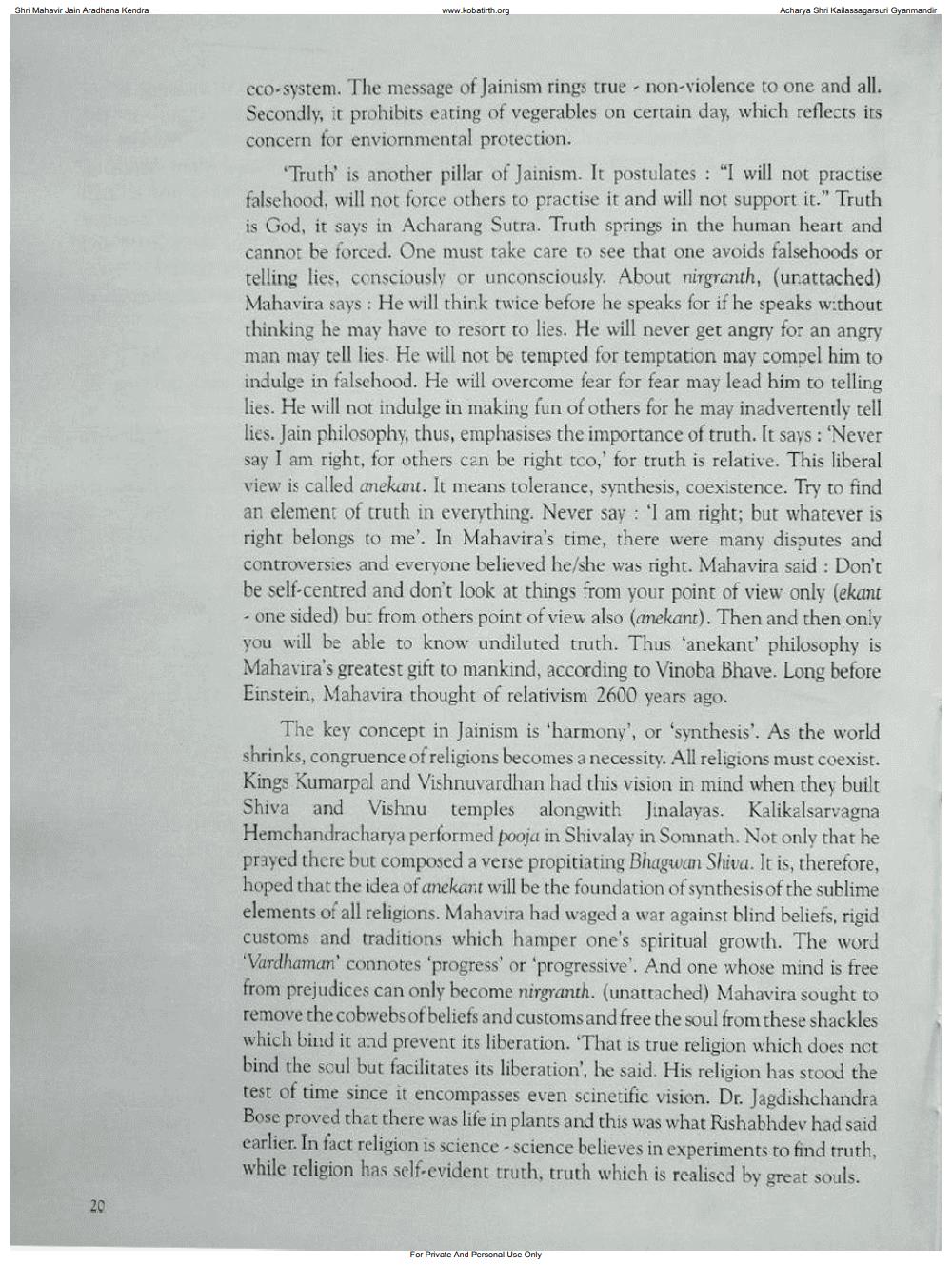________________
Shri Mahavir Jain Aradhana Kendra
www.kobatirth.org
Acharya Shri Kailassagarsun Gyanmandir
eco-system. The message of Jainism rings true - non-violence to one and all. Secondly, it prohibits eating of vegerables on certain day, which reflects its concern for enviornmental protection.
'Truth' is another pillar of Jainism. It postulates : "I will not practise falsehood, will not force others to practise it and will not support it." Truth is God, it says in Acharang Sutra. Truth springs in the human heart and cannot be forced. One must take care to see that one avoids falsehoods or telling lies, consciously or unconsciously. About nirgranth, (unattached) Mahavira says: He will think twice before he speaks for if he speaks without thinking he may have to resort to lies. He will never get angry for an angry man may tell lies. He will not be tempted for temptation may compel him to indulge in falsehood. He will overcome fear for fear may lead him to telling lies. He will not indulge in making fun of others for he may inadvertently tell lics. Jain philosophy, thus, emphasises the importance of truth. It says: 'Never say I am right, for others can be right too,' for truth is relative. This liberal view is called mekant. It means tolerance, synthesis, coexistence. Try to find an element of truth in everything. Never say : 'I am right; but whatever is right belongs to me'. In Mahavira's time, there were many disputes and controversies and everyone believed he/she was right. Mahavira said : Don't be self-centred and don't look at things from your point of view only (ekant - one sided) but from others point of view also (anekant). Then and then only you will be able to know undiluted truth. Thus anekant' philosophy is Mahavira's greatest gift to mankind, according to Vinoba Bhave. Long before Einstein, Mahavira thought of relativism 2600 years ago.
The key concept in Jainism is 'harmony', or 'synthesis'. As the world shrinks, congruence of religions becomes a necessity. All religions must coexist. Kings Kumarpal and Vishnuvardhan had this vision in mind when they built Shiva and Vishnu temples alongwith Jinalayas. Kalikalsarvagna Hemchandracharya performed pooja in Shivalay in Somnath. Not only that he prayed there but composed a verse propitiating Bhagwan Shiva. It is, therefore, hoped that the idea of anekant will be the foundation of synthesis of the sublime elements of all religions. Mahavira had waged a war against blind beliefs, rigid customs and traditions which hamper one's spiritual growth. The word "Vardhaman'connotes 'progress' or 'progressive'. And one whose mind is free from prejudices can only become nirgranth. (unattached) Mahavira sought to remove the cobwebs of beliefs and customs and free the soul from these shackles which bind it and prevent its liberation. 'That is true religion which does nct bind the scul but facilitates its liberation', he said. His religion has stood the test of time since it encompasses even scinetific vision. Dr. Jagdishchandra Bose proved that there was life in plants and this was what Rishabhdev had said earlier. In fact religion is science - science believes in experiments to find truth, while religion has self-evident truth, truth which is realised by great souls.
For Private And Personal Use Only




